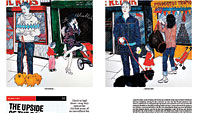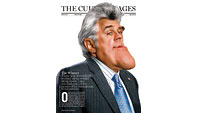
1. When the subject is money, you’re pretty much guaranteed to start arguments, which explains the fuss caused by “The Upside of the Downside” (February 11), Joel Lovell’s essay about how a recession could take the edge off New York’s money culture. The blog An English Major’s Money found merit in Lovell’s piece, offering New York a backhanded compliment: “Because [the magazine] as an institution is so obsessed with money, it treats money and class quite thoughtfully when it sets out to treat them explicitly instead of just laying out pages of $400 V-neck sweaters.” Others gave straight-up praise, such as one post that thanked Lovell for “articulating the inchoate thoughts of so many New Yorkers.” Dissenters judged Lovell to be self-absorbed, including one who wrote that he “is right to be ashamed of his lifestyle. He is not imagining it, he is indeed living the neo-Roman dream.” The blog Magazine MILF urged Lovell to stop dreaming: “Am I the only one who’s tired of the poor writers complaining about the rich finance guys? Here’s the beef: Unlike media people, who toil long hours to gain a high profile, finance people toil long hours to gain wealth … The rich are always going to live in better apartments, eat fancier cheese, and wear bigger jewels than the rest of us.”
2. Samantha Hunt’s eulogizing of Heath Ledger, a former Boerum Hill neighbor she never knew (“Intelligencer: Among Us,” February 4), was equally polarizing. “It is refreshing to read something about this tragedy that isn’t all about the gossip,” went one post on nymag.com; “Superbly written,” read another. Then out came the charges of sentimentalism, the petty name-calling, and the post that called Hunt’s own presence in the neighborhood “as symptomatic of Brooklyn’s demise as the Baskin-Robbins on Smith Street.”

3. The debate over Sam Anderson’s assessment of Jay Leno during the Hollywood writers’ strike (“The Culture Pages: The Winner,” February 4) was, on the other hand, notable for its civil tone. One poster wondered how Anderson could call Leno the winner when “Letterman’s ratings are up almost 10 percent since the strike, [and] Leno is flat,” which Anderson went online to address: “When I wrote the piece Leno was beating Letterman by 1 million viewers a night. Without writers. He wins.” Amid the back and forth over the relative strength of the late-night shows, one Leno sympathizer aptly distilled his man’s appeal: “Sometimes at the end of a long day you just want ‘funny’ that you don’t have to think about.”
4. Finally, Kurt Andersen incurred the wrath of one reader with his suggestion that if Hillary Clinton wins the Democratic nomination, he’ll vote for John McCain (“The Imperial City: Anatomy of a Freak Show,” February 4). “It is clear then that Andersen doesn’t care about issues,” wrote Alice Sulzer of Oviedo, Florida. “McCain says even if it takes 100 years we should stay in Iraq—Clinton says in 60 days we start to withdraw; McCain thinks our health-care system just needs a tiny tweaking while Clinton says we need universal health care; McCain believes the unconscionable tax cuts given to the most wealthy should stay in place while Clinton says these cuts need to be rolled back; McCain has no plans regarding global warming while Hillary has a very detailed plan. But Andersen simply cannot see himself voting for Hillary, to the point where he would vote Republican or … look for a white knight in Bloomberg. How shallow.”
Correction: In “Books: Hair of the Doggerel” (February 11), the author of the slogan “Coke Is It” should have been identified as Ken Schulman.
Please send e-mails to: comments@nymag.com